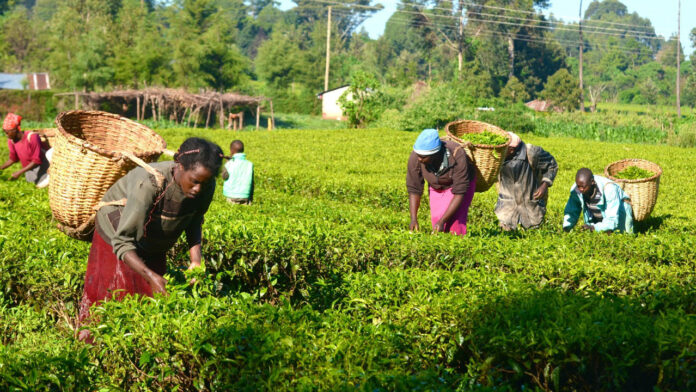Agric at 26%, followed by trade at 16%
By Jeph Ajobaju, Chief Copy Editor
Agriculture remains the largest sector of the economy, accounting for 25.9 per cent in value and 70 per cent employment, but it is largely stuck at a subsistence level and faces challenges that hinder food sufficiency in Africa’s most populous country.
The share of agriculture, collapsed into faming of all kinds, is way ahead of the top four economic sectors, which include trade, information and communication technology (ICT), and manufacturing, in that order.
Nigeria’s economy expanded 3.4 per cent in 2021, with an estimated value of N72.39 trillion, increasing from N70.01 trillion in 2020.
Gross Domestic Product (GDP), if calibrated from 2014, grew fastest in 2021, recovering from pandemic recession in 2020.
Agricultural contributed 25.9 per cent to GDP in 2021, sliding from 26.21 per cent in 2020, yet high enough to fetch the largest value to the economy, as stated in the National Bureau of Statistics (NBS) Q4 2021 GDP report.
_______________________________________________________________
Related articles:
Agric and manufacturing, others get N151.23b CBN boost
Cocoa tops agric exports with N63.18b. Cashew nuts rake in N42.94b
Nigeria exports N817.35b agric produce. Surpasses N652.08b imports
CBN loans to real sector, businesses rise 21%
__________________________________________________________________
Other sectoral contributions
Other major sectoral contributions to GDP in 2021 are as follows:
- Services – 53.56 per cent (up from 52.44 per cent in 2020)
- Industrial – 20.56 per cent (down from 21.36 per cent)
- Non-oil – 92.76 per cent (up from 91.87 per cent)
- Oil – 7.24 per cent (down from 8.16 per cent)
Below are additional details of the four top sectors which contributed more than 5 per cent overall to GDP in 2021, according to compilation by Nairametrics
Agriculture – 25.9%
Agriculture contributed 25.9 per cent to GDP, with an estimated value of N18.74 trillion. It grew 2.1 per cent year-on-year (YoY) from N18.35 trillion in 2020.
However, agriculture output is way below desired levels despite multiple interventions by the Central Bank of Nigeria (CBN) to develop the sector.
Agricultural imports take a significant amount of foreign exchange (FX) reserves with comparatively low inflow through export earnings.
The sector grew 2.13 per cent YoY, slower than 2.17 per cent printed in 2020.
Agriculture has four components:
- Crop production – N16.92 trillion value
- Livestock – N1.24 trillion
- Forestry – N193.22 billion
- Fishing – N384.45 billion
Trade – 15.7%
Trade expanded 8.62 per cent YoY to contribute 15.7 per cent to the economy with a value of N11.36 trillion.
Trading rebounded both domestically and internationally from Covid downturn in 2020. Total foreign trade jumped 7.1 per cent to $99.86 billion from $93.26 billion in 2020.
The sector is also poised to gain from the African Continental Free Trade Area (AfCFTA), which kicked off in 2021 to bolster trade among African nations.
CBN data shows Nigeria recorded its first trade surplus in Q4 2021 after enduring eight consecutive quarters of negative trade balance.
ICT – 15.5%
ICT yielded 15.5 per cent to GDP with a value of N11.23 trillion, a 6.55 rise above N10.54 trillion in 2020.
The sector was driven largely by telecommunication estimated at N9.15 trillion or 81.5 per cent of the total value of the ICT sector.
Telecom houses major net-valued companies, with MTN, Airtel, Glo, 9mobile among others, reporting trillions of naira in annual revenue.
However, the telecom sub-sector saw its slowest growth in 14 quarters in 2021.
Manufacturing – 9%
Manufacturing contributed 9 per cent to GDP with a value of N6.5 trillion, rising 3.35 per cent YoY from N6.29 trillion in 2020.
The sector has been largely disrupted by double-figure contraction of the oil refining sub-sector.
The 12 components of the manufacturing sector include:
- Oil refining
- Cement manufacturing
- Food
- Textile production
The contribution of manufacturing was largely driven by the N3.18 trillion valuation of the food, beverages and tobacco sub-sector and the N1.32 trillion cement industry.
Other sectors
Others sectors that contributed more than 5 per cent to GDP in 2021 include:
Mining and quarrying – 7.4 per cent
Real estate – 5.6 per cent




